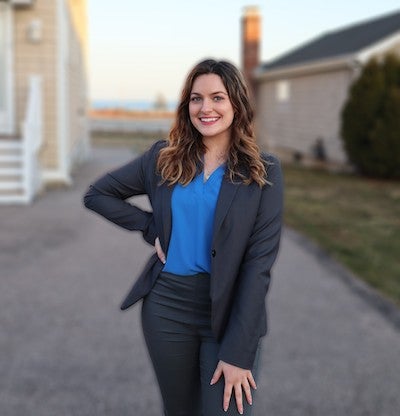Major: Landscape Architecture
Minors: Sustainability, Community Planning
Hometown: Cumberland, RI
Q. What makes the College of Arts and Sciences at URI unique?
A. URI’s College of Arts and Sciences provides an enhanced education by encouraging a broadened perspective. Unique courses spanning all disciplines in the college foster creative thinking and innovation. Every time I take a class that seemingly has no connection to landscape architecture, I find myself applying concepts from that class to my work. It allows me to think differently. I have learned that there is no such thing as an irrelevant class.
What accomplishments and/or activities at URI are you most proud of now?
Currently, I am the producer and graphic designer for the Department of Landscape Architecture’s Annual Lecture Series, hosted by the College of Arts and Sciences. It has allowed me to learn new software and meet guest lecturers within the profession.
Also, I facilitated an independent study focused on a special interest of mine: Designing for individuals with disabilities. I worked with the junior class of landscape architecture students who each designed playground modifications at the Cumberland Monastery, that are inclusive to the range of differences within the human experience. I chose the project site and brought guests in to aid in the process: The Cumberland Planning Director, as well as an expert in the field of human services.
What research projects, internships, experiential learning, and/or study abroad programs did you participate in at URI? How did they enhance your education?
Since last summer, I have participated in a GIS internship with the East Coast Greenway Alliance, been a Landscape Designer for a country club, gardener at an estate in Newport, Deck Designer for a decking company, Planning Consultant for the Cumberland Planning Department, and Co-Author of a report for a design project in Downtown Woonsocket. These work and internship experiences have shown me the different avenues available to landscape architecture graduates. The profession offers such a wide range of employment opportunities.
What do you value about your liberal arts education?
I believe that gaining introductory knowledge across numerous disciplines has helped me become a more thoughtful, open-minded student. Educating yourself and diversifying your knowledge base has the power to do that. Taking classes not required by my major has certainly helped me shift my worldview and grow to be a better designer.
How did the pandemic impact your senior year?
Surprisingly, COVID-19 has not disrupted my ability to find work. I have been able to work five different internships and/or part-time positions remotely since the beginning of the pandemic. Adjusting to communicating, presenting, and exchanging ideas remotely has been a challenge, but one we can all add to our skillset now.
What’s next for you?
Next, I am looking to enter the workforce as a landscape designer and eventually become a licensed Landscape Architect. My passion is to work on meaningful projects and create spaces that benefit communities and improve their quality of life. The ability to specialize in niche inclusive design projects would be a dream.

